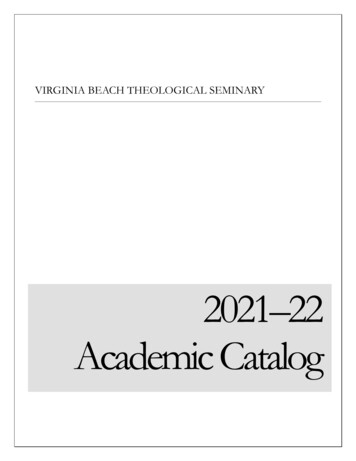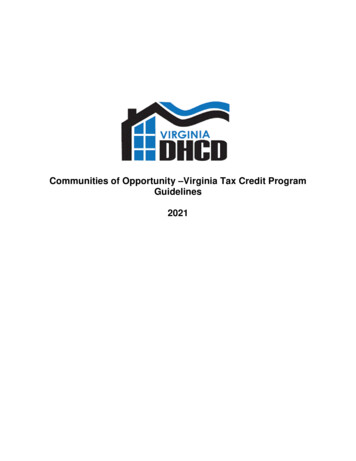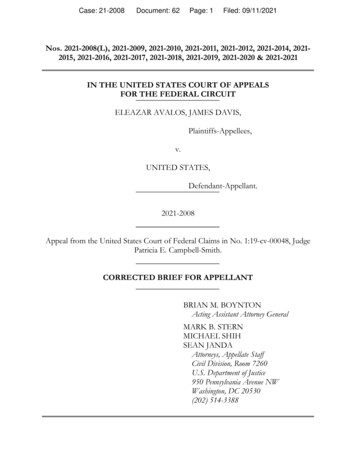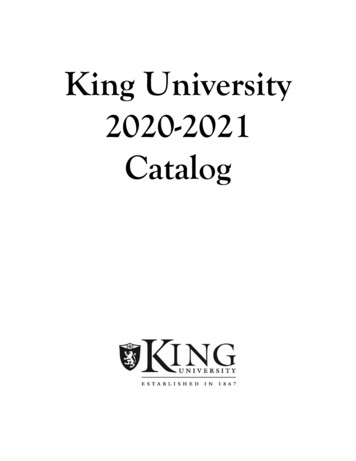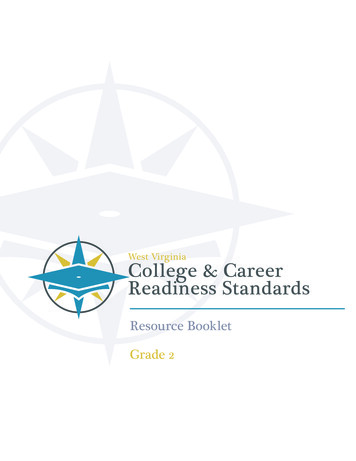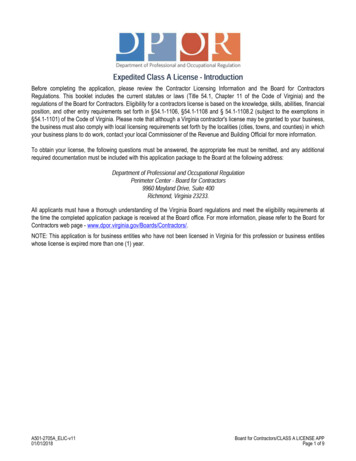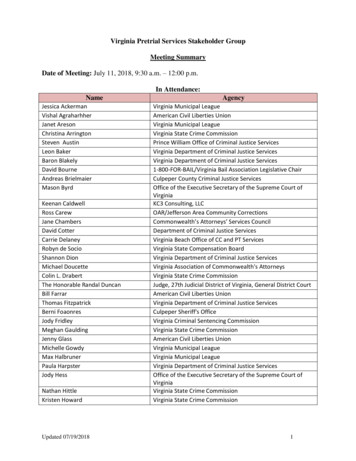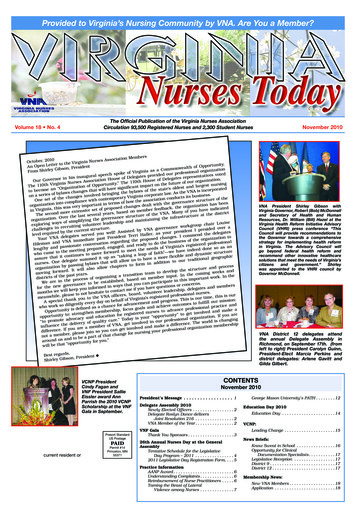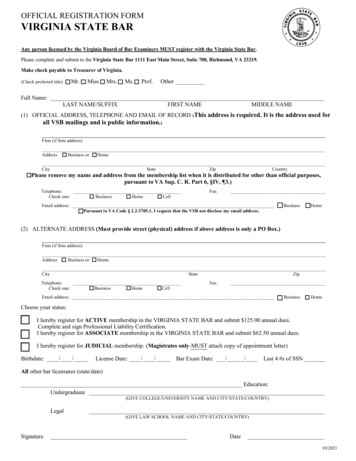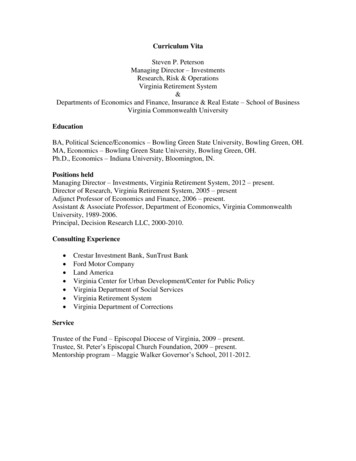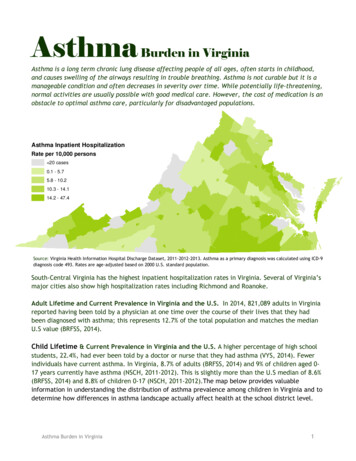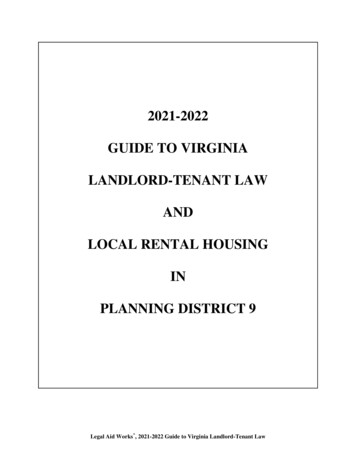
Transcription
2021-2022GUIDE TO VIRGINIALANDLORD-TENANT LAWANDLOCAL RENTAL HOUSINGINPLANNING DISTRICT 9Legal Aid Works , 2021-2022 Guide to Virginia Landlord-Tenant Law
Legal Aid Works Legal Aid Works (formerly Rappahannock Legal Services, Inc.) was established in 1973 inorder to provide free civil legal assistance to low income individuals and families. The Culpeperoffice provides services to eligible residents of Planning District 9, which includes Culpeper,Fauquier, Madison, Orange and Rappahannock Counties.The rental housing information in the 2021-2022 guide was provided by the individual propertymanagers. The legal information was provided by Legal Aid Works . Every effort has beenmade to ensure accuracy. All information was current at the time of publication (July, 2021).Legal Aid Works is not responsible for any changes that may have occurred after that time.Legal Aid Works Culpeper Office1200 Sunset Lane, Suite 2122Culpeper, Virginia 22701PHONE: (540) 825-3131(24-hour voice mail)FAX: (540) 825-3802EMAIL: LAWCulp@LegalAidWorks.orgWEBSITE: www.LegalAidWorks.orgLegal Aid Works would like to thank (1) the Fredericksburg City Planning Office for helpingus to fund the publication of this 2021-2022 Guide, (2) its summer law clerkGabrielle Sandoval, rising 2L student at University at Richmond School of Law for her efforts inupdating the state landlord-tenant law since the last guide in 2020-2021 and (3) summer internsChristian Taylor and Monzerrath Sandoval for their efforts in updating changes in local rentalhousing and Monzerrath Sandoval for translating this guide into Spanish.Limited copies of the 2021-2022 guide have been printed in English and Spanish. Thosereceiving copies are therefore encouraged to make additional copies of their own. Legal AidWorks also posts electronic copies of its English and Spanish language guides on its website.Legal Aid Works , 2021-2022 Guide to Virginia Landlord-Tenant Law 2
TABLE OF CONTENTS1)Equal Opportunity in Housing42)Overview of Landlord-Tenant Law6I.II.III.IV.V.3)Four Rules for Renters to RememberSigning a Lease and Moving InA.Written LeasesB.Oral AgreementsC.DisclosureD.Security DepositsE.Inspection of the DwellingF.Tenants in Foreclosed PropertiesDuring the Rental AgreementA.Tenant’s ResponsibilitiesB.Landlord’s ResponsibilitiesC.Right of Access by the LandlordD.Temporary Relocation of the Tenant for Non-Emergency RepairsE.Changes in Rental AgreementsF.Release of Tenant RecordsG.Retaliatory Conduct ProhibitedH.Property/Homeowner’s AssociationsEnding the Rental Agreement and Moving OutA.Terminating Leases and Oral AgreementsB.Return of the Security DepositC.The Eviction ProcessD.Disposal of Abandoned PropertyUtility ent Assistance Programs27I.II.2727Subsidized HousingTax Credit Programs4)Emergency Assistance.285)Transitional Housing296)Subsidized and Section 8 Housing317)Senior Housing348)General Rental Units369)Where to Get Information and Assistance37Legal Aid Works , 2021-2022 Guide to Virginia Landlord-Tenant Law 3
EQUAL OPPORTUNITY IN HOUSINGIT’S YOUR RIGHT!YOU MAY NOT BE DENIED HOUSING BASED ON RACECOLORRELIGIONSEXNATIONAL ORIGINDISABILITYELDERLINESSFAMILIAL STATUS (families with children)SOURCE OF FUNDS (e.g. a housing voucher)*SEXUAL ORIENTATIONGENDER IDENTITYVETERAN STATUS*The law does not apply to owners of four or fewer rental units in Virginia, or those who own a10% or less interest in four or more units. The law also does not apply if the source of funds isnot approved within 15 days of submitting the request to approve the tenancy.Realtors, real estate agents, rental agents, and most landlords must show you ALL AVAILABLEhousing based on your financial ability only! If you feel that you have been denied anopportunity to see or obtain housing, or even been treated with less enthusiasm because of youridentity as a member of any of the above listed protected classes, or because you have children,PLEASE call HUD at 800-669-9777 (TTY for the hearing impaired at 800-927-9275. You canalso contact the Virginia Fair Housing Office at 804-367-8530 or 888-551-3247, or visit theirwebsite at nation is not always obvious, and is more often subtle acts or statements. For a freebrochure explaining your rights, options, and the sometimes subtle discriminatory actions,contact the Fredericksburg Area Association of Realtors at (540) 373-7711.SPECIAL TIPS TO KNOWDISABLED TENANTS – must be allowed to make reasonable modifications to their individualunits and to the common access areas. Special parking must be allowed. A “no pet” policycannot prevent a person from keeping an assist animal. For example, Seeing Eye dogs are notconsidered “pets” and MUST be allowed without any extra charge or fee by most landlords.Discrimination against disabled persons may be: a landlord’s refusal to allow a disabled tenant tomake reasonable and necessary modifications to the premises at the tenant’s expense, or a refusalto make reasonable and necessary accommodations to rules, policies, or services. It may also beLegal Aid Works , 2021-2022 Guide to Virginia Landlord-Tenant Law 4
refusal to renew or terminate a lease or a landlord making changes to an existing lease/rentalagreement because of a tenant’s disability.The Disability Resource Center is available to assist persons with disabilities in locatinghousing. Call 540- 373-2559. TTY for the hearing impaired 540-373-5890.CHILDREN – Although a reasonable limit on the number of occupants is allowed, this limitcannot mandate “no children.” For example, a 1 bedroom unit that allows 2 adults must allow 1adult and 1 child. A 3 occupant limit must allow a single person with 2 children.NOTE: Landlords may impose occupancy standards restricting the maximum number ofoccupants to two (2) persons per bedroom.ELDERLINESS – Although the Federal Housing Laws do not cover age, Virginia’s fairhousing laws make it illegal to discriminate based on elderliness. Elderliness refers to anypersons who have reached their 55th birthday. Neither landlords nor their agents are allowed tosteer elderly persons away from or toward any particular housing units.Sometimes landlords or their agents make discrimination seem reasonable or acceptable. It isYOUR DECISION where to live! If you feel like you have been discriminated against, and ifyou want to fight it, call HUD at 800-669-9777, or the Virginia Fair Housing Office at either804-367-8530 or 888-551-3247.NOTE: All HUD-assisted or HUD-insured housing, including housing under the HousingChoice Voucher Program, shall be made available without regard to actual or perceivedsexual orientation, gender identity, or marital status. Landlords also may not ask aboutsexual orientation to determine eligibility for HUD-assisted housing.Legal Aid Works , 2021-2022 Guide to Virginia Landlord-Tenant Law 5
OVERVIEW OF LANDLORD-TENANT LAWMany leases in Virginia are governed by the Virginia Residential Landlord & Tenant Act(“VRLTA”) and nationally by the Civil Rights Act of 1968 (“Fair Housing Act”).I. FOUR RULES FOR RENTERS TO REMEMBERThese rules cannot prevent every problem that a renter may face, but following them is likely toprevent a lot of confusion and stress.1) Read written leases completely. Not knowing what’s in the lease doesn’t excuse youfrom responsibilities.2) Put agreements in writing. Agreements are hard to prove if they are not in writing. Ifthe landlord tells you he will clean the carpeting after you move in, get that in writing. Ifit’s important to you, then you will have to prove that this agreement existed. You canonly do that if you have it in writing.3) Discuss problems with the other party. Cooperation with the landlord is your bestinsurance for resolving problems.4) Notify the other party in writing. If you can’t resolve a problem, then a statement ofthe problem should be put in writing promptly and sent to the landlord. You must keep acopy of the letter to prove notification has been given.II. SIGNING A LEASE AND MOVING INA.BEFORE YOU SIGNA landlord must offer a prospective tenant a written rental agreement containing the terms ofrental of the dwelling unit and the terms and conditions of the landlord-tenant relationship.In addition to the rental agreement, landlords must also give prospective tenants the statement oftenant rights and responsibilities developed by the Department of Housing and CommunityDevelopment. This statement must be signed by both landlord and tenant within one month ofthe effective date of the rental agreement. A landlord may not sue a tenant in any court for anyreason unless this statement has been signed.RENTAL AGREEMENTS MAY NOT INCLUDE: Provisions where the tenant can agree to give up any tenant rights or remedies, or agreeto waive any of the landlord’s responsibilities or liability. These provisions areunenforceable by a court and a tenant can recover damages and court fees from a landlordattempting to enforce any such provision. Provisions demanding or accepting payment of any fee, charge, or other thing of valuefrom any provider of cable television service, cable modem service, satellite masterantenna television service, direct broadcast satellite television service, subscriptiontelevision service, or service of any other television programming system in exchange forLegal Aid Works , 2021-2022 Guide to Virginia Landlord-Tenant Law 6
granting a television service provider mere access to the landlord's tenants or giving thetenants of such landlord mere access to such service.Protecting status of Domestic Abuse Survivors: A landlord must consider a person’s status asa domestic abuse survivor when reviewing a credit score in a rental application. Survivor statuscan be shown by a court order, police report, or letter from a sexual & domestic violenceprogram, housing counselor, or attorney.Prohibition on using negative credit information arising from the COVID-19 pandemicagainst tenants or applicants for tenancy: A landlord who owns more than four rentaldwelling units or more than a 10 percent interest in more than four rental dwelling units, whetherindividually or through a business entity, in the Commonwealth, shall not take any adverseaction against an applicant for tenancy based solely on payment history or an eviction fornonpayment of rent that occurred during the period beginning on March 12, 2020, and ending 30days after the expiration or revocation of the state of emergency declared by the Governorrelated to the COVID-19 pandemic. This protection is set to expire either seven years after theexpiration of any state of emergency declared by the Governor related to the COVID-19pandemic or on July 1, 2028, whichever is later.B.WRITTEN LEASESA lease is a contract. You should read and understand all sections of the lease beforesigning. If a lease is signed by the tenant and the landlord, a copy shall be provided to the tenantwithin 1 month. Payment of rent by a tenant or collection of the rent by a landlord can create alease between the parties even if a written lease has not been signed.If a landlord fails to offer a written agreement, the following default conditions will be appliedby law: the lease will last for 12 months and will not be automatically renewed (except for amonth-to-month lease). Rent is due on the first of each month in equal installments. If theamount of each installment is not agreed upon, they will be set at “fair market rent.” Rent is lateif not paid by the fifth of each month, and landlords may charge late fees. Landlords may alsorequire a security deposit. This does not prevent landlord and renter from creating a writtenrental agreement during the 12-month period.C.ORAL AGREEMENTSAn oral agreement needs to be put in writing to be easily enforced. Example: if a landlord tells atenant that a dwelling will be painted, that promise should be put in writing to become part of therental agreement.D.DISCLOSUREAt the time of move-in, the landlord must give the tenant written notice of the name and addressof: 1) the person or persons authorized to manage the premises, and 2) the owner, or person whoacts in legal matters for the owner.Legal Aid Works , 2021-2022 Guide to Virginia Landlord-Tenant Law 7
Tenants moving in must be notified of any planned conversion in the next 6 months that woulddisplace them. If the property is sold, the landlord must notify the tenant of the name, address,and phone number of the new owner.In addition, if the property is a multifamily dwelling unit located in any locality in which amilitary air installation is located, a prospective tenant shall be provided with a written disclosurethat the property is located in a noise or accident potential zone, or both, as designated by thelocation on its official zoning map. If such a disclosure is not provided, a tenant may terminatethe lease agreement anytime during the first 30 days by sending to the landlord a written noticeof termination by certified or registered mail.TENANTS AFFECTED BY FAULTY CHINESE MANUFACTURED DRYWALLIf a landlord has knowledge of the existence of defective drywall with origins of Chinesemanufacturing that has not been remedied, the landlord must provide prospective tenants with awritten disclosure that the property contains such defective drywall.o Any tenant not provided with the written disclosure above may end his or her leasewithin 60 days of discovering the defective dry wall. If a tenant wishes to end his or herlease early, the landlord must be notified in writing.o Termination of the lease is the only remedy that a tenant has for a landlord’s failure todisclose the defective dry wall to the tenant.NOTE: EFFECTIVE July 1, 2014, if the landlord has actual knowledge that the propertywas previously used to manufacture methamphetamine (meth) and has not been cleanedaccording to Department of Health guidelines, the landlord must provide writtendisclosure before renting the property. If the landlord did not disclose, then the tenantmay end the lease agreement within 60 days of discovering that the property was used tomanufacture meth and not cleaned by the guidelines. The tenant must provide a writtennotice to the landlord and terminate the lease within one month after sending that noticeto the landlord.E.SECURITY DEPOSITSBefore a tenant moves into a unit, the landlord may require the tenant to pay a security deposit.Here are some important facts about security deposits:1. Security deposits cannot exceed the amount of 2 months’ rent, even without a writtenagreement.2. Landlords may allow tenants to provide security deposit insurance for all or part of thesecurity deposit requirement. Security deposit insurance guarantees an amount of moneyto the landlord to pay for damage to the rental unit that would normally be withheld fromthe security deposit, so that a tenant can get their deposit back faster and make movingeasier.3. When a tenant moves, the landlord may withhold all or some of the security deposit. Thelandlord may legally withhold the security deposit for things like unpaid rent (includingLegal Aid Works , 2021-2022 Guide to Virginia Landlord-Tenant Law 8
late fees), damage caused by the tenant beyond reasonable wear and tear, and utility feesupon move-out.4. Landlords can require tenants to pay the premiums for damage insurance, renter’sinsurance, or both. These payments are rent, and the tenant will never get them back.However, a landlord cannot require a tenant to pay more than two months’ rent insecurity deposits, damage insurance, and renter’s insurance combined.Note: Where a landlord obtains damage insurance or renter’s insurance for thetenant, the landlord shall name the tenant as a “co-insured.”If a tenant allows insurance required by the rental agreement to lapse the landlordmay provide any landlord’s renter’s insurance to cover the tenant. The tenant willhave to pay that coverage until they provide written documentation of a reinstatedinsurance.5. A landlord may also require a refundable application deposit and a nonrefundableapplication fee.Effective July 1, 2014, landlords are no longer required to pay interest on security deposits.Many disputes occur between landlords and tenants over the amount of money that the landlordcan legally withhold from a security deposit. For information about the law governing the returnof the security deposit, see page 23.F.INSPECTION OF THE DWELLINGAn inspection of the dwelling unit when it is first occupied is very important. This inspectioncan ensure your security deposit is returned to you. An inspection checklist should note alldamages or defects to the property in each room (such as problems with or damage to windows,doors, woodwork, ceilings and walls, floors, cabinets, plumbing pipes and fixtures, structuralsystems, and appliances).The inspection checklist should also indicate whether there is any visible evidence of moldin the unit. If there is visible evidence of mold, the tenant may reject or accept the tenancy.If the tenant decides to accept, the landlord shall promptly remediate the mold condition,reinspect the dwelling to confirm that there is no visible evidence of mold in the dwelling, andprepare a new report stating that there is no visible evidence of mold in the dwelling unit uponreinspection. This must be done no later than 5 business days after the tenant chooses to accept.The landlord has 3 options for inspection:1) Inspect the dwelling unit themselves and provide a copy of itemized damages to thetenant within 5 days of occupancy. The tenant may request additional items to be addedor object to any item on the list within 5 days of receiving the landlord’s report, afterwhich the report is deemed correct and final.2) Adopt a written policy to allow the tenant to submit the itemized damage list within 5days of occupancy. The landlord can object to any item on the list within 5 days ofreceiving the tenant’s report, after which the report is deemed correct and final.Legal Aid Works , 2021-2022 Guide to Virginia Landlord-Tenant Law 9
3) Adopt a written policy to provide that the landlord and tenant shall prepare the inspectionreport jointly. In this case the report is deemed correct and final after it is signed by bothlandlord and tenant.If the landlord does not follow any of these three options, a tenant should still submit anitemized damage list of their own.G.TENANTS IN FORECLOSED PROPERTIESVirginia LawA landlord must notify a tenant in writing within 5 business days of the landlord receivingwritten notice from their mortgage lender of a mortgage default, of mortgage acceleration, or of aforeclosure sale.o If the landlord fails to provide the notice required, the tenant has the option toimmediately terminate the lease agreement upon 5 business days’ notice to the landlordand is entitled to a return of the security deposit in accordance with the law or the rentalagreement, whichever is applicable.o If the dwelling is vacant, the landlord must disclose to any prospective tenants in writingat or before the start of tenancy of a mortgage default, notice of mortgage acceleration ornotice of foreclosure sale relating to the dwelling unit.o The landlord is not required to notify tenant if the managing agent does not receivewritten notice from the mortgage lender or if the tenant provides a copy of written noticefrom the lender to the landlord (such as if the notice comes to the rental property and thetenant gives the notice to the landlord.)NOTE: A tenant who entered into a lease before a notice of foreclosure may remain in theforeclosed property until the end of the lease unless the property is purchased by a bona fidepurchaser who will reside in the property as their primary residence. In which case, the tenantmust receive 90 day notice before being forced to vacate.III. DURING THE RENTAL AGREEMENTLandlords and tenants both have specific rights and responsibilities during the lease. It isimportant to know these rights and responsibilities. Otherwise, both landlords and tenants mayunknowingly violate the law.A.TENANT’S RESPONSIBILITIES1.PAYMENT OF RENTRent must be paid at the time and place designated by the landlord, and in the form requested(cash, check, money order).Legal Aid Works , 2021-2022 Guide to Virginia Landlord-Tenant Law 10
Effective July 1, 2014, landlords may require that tenants pay the government or service fees forenergy sub-metering if the technology is included in the home and if the lease allows for thesepayments. They are non-refundable and count as rent. Late charges for failure to make a timelypayment for sub-metering may not exceed 5.Failure to pay rent when due, including repeated late payment of rent, or the voluntarywithholding of rent (for whatever reason) may be a violation of the rental agreement. This maycause the landlord to take the following protective measures allowed by law:a) Fourteen day pay-or-quit notice: The landlord may issue a notice giving the tenant 14days to pay the rent in full or vacate the premises. Previously 5 days, COVID-19protections have extended the pay-or-quit time frame. However, such protections are setto expire July 1, 2022.b) Unlawful detainer warrant: If full payment of rent is not made within 14 days and thetenant fails to vacate, the landlord has the right to begin eviction proceedings against atenant in the local general district court. However, it does not relieve a tenant of hisobligation to fulfill the terms of the rental agreement. Landlords may ask the court toamend the amount of rent that they claim from their tenant, but may not file additionalunlawful detainer actions in order to update their claim.c) Eviction: The eviction will be dismissed if the tenant pays all rent that is owed (plusreasonable late charges and attorney fees, if any, and court costs) to the landlord or intothe court 48 hours before the sheriff executes the writ of possession. See “The EvictionProcess” on page 20 for more details.If the tenant disputes the amount of rent owed, they must appear on the return date to get asecond court date for a hearing on the dispute. If they do not appear, the court will enter a defaultjudgment for the landlord. If the court enters a judgment for possession in favor of the landlord atthe first or second court date, the tenant has 10 days to appeal to Circuit Court and post anapproved bond. The amount required for a bond shall be the claimed outstanding rent, plus anylate fees and relevant legal costs. Otherwise, on the 11th day, the local sheriff can serve a writ ofeviction to forcibly evict the tenant and his/her belongings. If the tenant does not voluntarilymove within 72 hours of being served the writ of eviction, the sheriff can return to forcibly evictthe tenant and his property.After the court enters an order for possession, the landlord has 180 days to request a writ ofeviction. The landlord may cancel their writ and request another one if still within 180 days.The sheriff must execute the writ of eviction within 30 days of the writ being issued by the court.Otherwise, it is invalid and may not be used.Effective July 1, 2019, if a tenant does not pay owed rent and related fees by their firstcourt date, they may still get their eviction dismissed if they pay the claimed amount to thelandlord or the court no less than two business days before the date that the sheriff isscheduled to serve the writ of eviction.Legal Aid Works , 2021-2022 Guide to Virginia Landlord-Tenant Law 11
VIRGINIA RENT RELIEF PROGRAM (RRP): Depending on availability of funds andhousehold need, the RRP may provide financial assistance for rent payments for eligiblehouseholds. This includes financial assistance for rent payments past due beginning April 1,2020 and onward with opportunity for renewal based on availability of funding and thehousehold’s need for additional assistance and continued eligibility.Note: Chesterfield County and Fairfax County are administering separate local programs.The RRP will provide financial assistance on behalf of renters who meet the following criteria: Have a valid lease in their name or other documentation confirming the landlord-tenantrelationship; and Have experienced a negative financial impact due to the Coronavirus pandemic, Have a rent amount that is at or below 150% Fair Market Rent (FMR), or Have a gross household income at or below 80% area median income (AMI) (based oncurrent month’s income). The determination of income includes any unemploymentinsurance received by a member of the household but does not include one-timepayments such as a stimulus check.The Center for Disease Control (CDC) has also issued a temporary moratorium on evictions fornonpayment of rent nationwide due to the COVID-19 pandemic which is set to expire onOctober 3, 2021. To be eligible for the CDC’s eviction moratorium, renters must meet thefollowing qualifications:1) You have used your “best efforts” to obtain government rental assistance from your state;2) You do not expect to earn more than 99,000 in 2021 (or 198,000 if you are married andfiled a joint tax return), or you did not need to report income to the federal government in2020, or you received an Economic Impact Payment (stimulus check) this year;3) You have been experiencing a “substantial” loss of household income because of a layoffor reduced work hours, or you have “extraordinary” out-of-pocket medical expenses(defined as an unreimbursed medical expense that exceeds 7.5% of your adjusted grossincome for the year);4) You have been making your best effort to make partial rent payments as close to the fullamount due as possible; and5) Being evicted would cause you to become homeless or you would have to move in with afriend or family member (live “doubled up”).ANDIf you meet all of these conditions listed above, you must provide a signed declaration to yourlandlord: s/EvictionDeclare d508.pdfWhile the CDC’s order does not require you to provide any proof with the declaration, landlordsmay challenge tenants’ declarative statements. Tenants should keep all documents on hand incase a court allows your landlord to challenge the declaration. The CDC’s order does not requirethat a tenant’s financial hardship be COVID-related.UNDER VIRGINIA LAW, A LANDLORD CANNOT FORCIBLY EVICT A TENANT ONHIS OWN. THE LANDLORD MUST USE THE COURTS TO DO SO. THUS, IT ISILLEGAL FOR A LANDLORD TO LOCK OUT A TENANT OR TERMINATE THETENANT’S UTILITIES ON THEIR OWN.Legal Aid Works , 2021-2022 Guide to Virginia Landlord-Tenant Law 12
The estimated length of time from the 14 day pay-or-quit notice to actual forced eviction of thetenant is about 30 days without a hearing. An extra 2-4 weeks are required with a hearing.Charges for late rent: Effective April 22, 2020, a landlord may charge a late fee of no morethan 10% of the periodic (monthly or weekly) rent, or 10% of the remaining balance due andowed, whichever is smaller, and only if the late fee is provided for in the written leaseagreement. If the late fee is not in the written lease a landlord may not enforce one.Rent Check Drawn on Insufficient Funds: If a landlord receives, as a rent payment, a checkor electronic funds transfer taken from an account without enough money to cover the value ofthe check or electronic transfer, OR if a stop-payment order has been placed in bad-faith by thetenant, written notice may be given to the tenant requiring payment within 5 days by cash,cashier’s check, certified check, or completed electronic funds transfer. If such payment is notreceived, the landlord may take action to evict the tenant just like he can when a tenant fails topay rent. A landlord may also charge a bad check fee not to exceed 50.00.Eviction Diversion Pilot Program: Tenants subject to unlawful detainer cases in the cities ofDanville, Hampton, Petersburg, and Richmond may enter a court-monitored payment planin order to pay their rent. Tenants must appear at the first docket call of their case and requestentry to the Program, and must also testify that they are employed / are able to make paymentsin addition to explaining why they were unable to make rent.Several restrictions apply to tenants who wish to enter the Program. Tenants may not: Within the last 12 months, have been late on rent more than twice in 6 months or threetimes in 12 months, Have participated in an eviction diversion program within the last 12 months, Have exercised their right of redemption within the last six months, or at any pointbefore July 1, 2020.Tenants are required to pay 25 percent of their landlord’s requested amount up-front. Over thenext three months, they must then pay 25 percent of the amount by the fifth day of eachmonth.Landlords should give written notice to the court clerk and to the tenant if the tenant misses apayment under the plan. The tenant will then have 10 days to file an affidavit stating that therent has actually been paid. Failure to make a payment under the program may lead toaccelerated eviction proceedings and further legal judgments.Landlords are not prohibited from filing additional unlawful detainer actions for non-rentviolations (e.g., disturbing other tenants). Landlords and tenants may also enter paymentagreements outside of the Program.The Eviction Diversion Pilot Program goes into effect on July 1, 2020, and will expire on July1, 2023.Legal Aid Works , 2021-2022 Guide to Virginia Landlord-Tenant Law 13
2.MAINTAINING A CLEAN AND SAFE DWELLINGA tenant has the obligation to maintain a clean and safe dwelling. Tenants must:1) Conduct themselves and require their visitors to conduct themselves in a manner thatdoesn’t violate the peace and enjoyment of the neighbors;2) Not deliberately destroy or damage any part of the dwelling;3) Abide by all reasonable and lawful rules and regulations of the lease;4) Use all utilities, facilities, and appliances in a reas
This statement must be signed by both landlord and tenant within one month of the effective date of the rental agreement. A landlord may not sue a tenant in any court for any reason unless this statement has been signed. RENTAL AGREEMENTS MAY NOT INCLUDE: Provisions where the tenant can agree to give up any tenant rights or remedies, or agree
